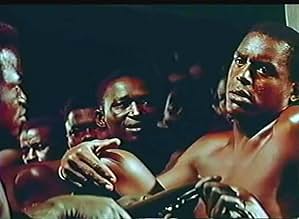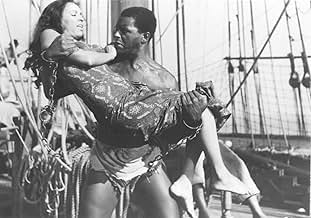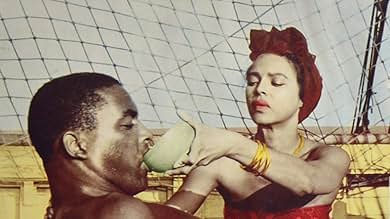Tamango
- 1958
- Tous publics
- 1h 44min
NOTE IMDb
6,5/10
462
MA NOTE
Ajouter une intrigue dans votre langueA Dutch slave captain, on a voyage to Cuba, faces a revolt fomented by a newly captured African slave, Tamango. The slaves capture the captain's mistress, forcing a showdown.A Dutch slave captain, on a voyage to Cuba, faces a revolt fomented by a newly captured African slave, Tamango. The slaves capture the captain's mistress, forcing a showdown.A Dutch slave captain, on a voyage to Cuba, faces a revolt fomented by a newly captured African slave, Tamango. The slaves capture the captain's mistress, forcing a showdown.
- Réalisation
- Scénario
- Casting principal
Avis à la une
It's ironic to me that in the late 50s when the civil rights movement was getting
into high gear it was a French film that talked about slavery. Very few films
were made about the slave trade in studio era Hollywood. Offhand I can think of only two, Paramount's Souls At Sea and MGM's Stand Up And Fight.
Tamango was a French film and the title role is played by one Alex Cressan who made this and no other film. He is captured and sold to Dutch slavers and bound for Havana with others in a ship captained by Curt Jurgens.
Jurgens who does a lot of his thinking from south of the border has a bit of comfort in the bewitching Dorothy Dandridge. She's resigned herself to her life as a concubine, but has some concerns for her fellow Africans.
Herein is the problem with Tamango, A really good film about the brutality of the slave trade is spoiled by a personal story that seems almost soap operish. The cargo also carries woman slaves as well and no doubt the crew took and the captain could have availed himself there and I'm sure many did. It was the same criticism I made about All The Brothers Were Valiant where Robert Taylor has Ann Blyth aboard. You just didn't bring women on board back in those days. Too many problems with the crew's morale.
In any event the revolt of the cargo of slaves was well done and truly inspirational. Could be compared with Amistead which was about a true incident of a slave revolt.
A good film that falls just short of greatness is Tamango.
Tamango was a French film and the title role is played by one Alex Cressan who made this and no other film. He is captured and sold to Dutch slavers and bound for Havana with others in a ship captained by Curt Jurgens.
Jurgens who does a lot of his thinking from south of the border has a bit of comfort in the bewitching Dorothy Dandridge. She's resigned herself to her life as a concubine, but has some concerns for her fellow Africans.
Herein is the problem with Tamango, A really good film about the brutality of the slave trade is spoiled by a personal story that seems almost soap operish. The cargo also carries woman slaves as well and no doubt the crew took and the captain could have availed himself there and I'm sure many did. It was the same criticism I made about All The Brothers Were Valiant where Robert Taylor has Ann Blyth aboard. You just didn't bring women on board back in those days. Too many problems with the crew's morale.
In any event the revolt of the cargo of slaves was well done and truly inspirational. Could be compared with Amistead which was about a true incident of a slave revolt.
A good film that falls just short of greatness is Tamango.
A movie that, in 1958, at last began to approach the real horror of slavery, and gives us a suspenseful story besides. A group of Africans is taken aboard a Dutch slave ship in 1820, and their leader, Tamango (Alex Cressan) begins planning a rebellion, at first rather quietly, with what is practically civil disobedience - not eating the food. The film does a fantastic job at humanizing the Africans, and we see their reactions to be what any other captive group's would be, covering a wide range - despair, fear, submission, bravery, and intelligent scheming. We see the outright cruelty on the part of the slavers - throwing a man overboard to make an example to the group, hanging another, and leaving Tamango out in the sun as punishment - but to director John Berry's credit, it's not overdone, and we see the human side of these people as well, in their conversations and little moments. Far more insidious is the pervading view of racial superiority, so that underneath what is apparent civility is a monster, one that views others as property, and of no more value than that.
To those who cringe because Dorothy Dandridge is a "mistress" or is involved in an "interracial romance" because they believe it takes away from the central message of the film, I ask that you look again - she's a slave, owned by the captain of the ship, and forced to have sex with him. She makes what she really thinks of him very clear when he dupes her into thinking he's written out orders for her freedom. I think it does the film a disservice to see her involvement with the man as willing, and it does Dandridge one as well, since the actress fought for changes to the script to make this point clear. It's ironic that the miscegenation that got the film banned by conservatives in the United States upon its release in France, is today decried by liberals as a weakness, when neither group seem to fully recognize the main point of the film, and what Dandridge's (admittedly conflicted) role was.
With that said, there is something a little off about the film as a whole - probably the dialogue, which seems a little stilted at times (even allowing it the shortcut of not showing the usage of translators between languages, and has everyone speaking English). The acting itself is fine, and it's well cast. It's a shame that this was Alex Cressan's only performance, because he has such strong presence. Dandridge was at the height of her powers, and while that sadly had very little roles coming her way even after her fantastic performance four years earlier in 'Carmen Jones', she's a joy to behold here. Curd Jürgens is great as well as the captain, and the staging about the ship is reasonably realistic as well.
If you look at a list of films which portray slavery sorted by year, you'll see 'Tamango' is one of the earliest to show it honestly, and for that, it deserves respect. The film feels ahead of its time, and I admire blacklisted director John Berry's courage. He went to Europe and made a film that certainly didn't make him more loved in America because of its scenes with Dandridge and Jürgens kissing, and because of its realistic portrayal of slavery - something Hollywood and America were still having a hard time coming to terms with. Not perfect, but a very good film, and deserves to be better known.
To those who cringe because Dorothy Dandridge is a "mistress" or is involved in an "interracial romance" because they believe it takes away from the central message of the film, I ask that you look again - she's a slave, owned by the captain of the ship, and forced to have sex with him. She makes what she really thinks of him very clear when he dupes her into thinking he's written out orders for her freedom. I think it does the film a disservice to see her involvement with the man as willing, and it does Dandridge one as well, since the actress fought for changes to the script to make this point clear. It's ironic that the miscegenation that got the film banned by conservatives in the United States upon its release in France, is today decried by liberals as a weakness, when neither group seem to fully recognize the main point of the film, and what Dandridge's (admittedly conflicted) role was.
With that said, there is something a little off about the film as a whole - probably the dialogue, which seems a little stilted at times (even allowing it the shortcut of not showing the usage of translators between languages, and has everyone speaking English). The acting itself is fine, and it's well cast. It's a shame that this was Alex Cressan's only performance, because he has such strong presence. Dandridge was at the height of her powers, and while that sadly had very little roles coming her way even after her fantastic performance four years earlier in 'Carmen Jones', she's a joy to behold here. Curd Jürgens is great as well as the captain, and the staging about the ship is reasonably realistic as well.
If you look at a list of films which portray slavery sorted by year, you'll see 'Tamango' is one of the earliest to show it honestly, and for that, it deserves respect. The film feels ahead of its time, and I admire blacklisted director John Berry's courage. He went to Europe and made a film that certainly didn't make him more loved in America because of its scenes with Dandridge and Jürgens kissing, and because of its realistic portrayal of slavery - something Hollywood and America were still having a hard time coming to terms with. Not perfect, but a very good film, and deserves to be better known.
I was quite impressed with this film, mostly for the incredible strides forward it made in portraying the horrors of the slave trade and horrific abuse of the kidnapped and enslaved Africans. The epic miniseries Roots, two decades later, and Spielberg's Amistad some 40 years after this film offer more detail and arguably higher production values, but Tamango is well worth watching, especially for those keen on either film or world history. Like another reviewer, I found the acting a little flat, despite the presence of the talented Curd Jurgens and Dorothy Dandridge. But the performances of all were engaging enough for me to want to stick with it to see the resolution of the conflicts. I was also very impressed to see the relationship between CJ's and DD's characters, at a time in the US when white mobs were trying to prevent children of different colors from going to school together, and a decade before the US Loving case forced states to accept marriages between people of different colors.
When I was 7 years old I saw the ads of «Tamango» in the press and posters in cinemas as I passed them by, but when I was old enough to see it (it was classified "for adults only") it had vanished from sight. Now that I finally watched it, when it was finished I was in awe. What a good film! Of course it does help that the final 10 minutes are simultaneously tense and poetic leading to a highly dramatic ending. But six decades after its original release, it is still a motion picture of strong content and great visual impact (although the copy I saw is not in the original 2.35:1 aspect ratio and the colors have faded).
Released in 1958 it is an adaptation of Prosper Mérimée's 1829 homonymous novella (before he wrote his most famous «Carmen»). Significant changes were made for this screen version, but the final plot is also set in the early 19th century. In the coast of Guinea, warrior Tamango (Alex Cressan) and a sizable group of men and women have been sold to Reinker, a Dutch slave trader (Curt Jürgens) and they board the ship Esperanza that sets sails to Cuba, where they will be sold again, this time in the slave market. On route the violent conflict between the Caucasian sailors and the black slaves intensifies, the interracial sexual liaison between Reinker and a beautiful African woman named Ayché (Dorothy Dandridge) breaks, and Tamango leads a mutiny against the slavers.
In the final script that went through significant re-writing due to Dandridge's insistence (who also refused to wear costumes that were offensive to the African woman, as designed by a Parisian designer), Ayché and Tamango are no longer lovers, he does not sell her but the two are victimized, and instead of surviving in Kingston the warrior fights until the end. These script changes turn Tamango and Ayché into icons of racial struggle, while the sincere, intense passion Reinker feels for Ayché is one of the first screen recognitions of many Europeans' love or lust for Africans.
In the time it was made «Tamango» must have been some kind of a political and educational «audiovisual pamphlet», invaluable for those who were involved in the fight for the civil rights of Afro-descendants in the United States and elsewhere. No wonder it was banned in a few countries, and surely not only for the Reinker-Ayché relationship.
I first saw the English-dubbed version: it becomes a bit hard in the first scenes to accept Dandridge as an African girl, with her American accent, but one gets used to it and thankfully she only has the necessary dialogue. Cressan, a medical student from Martinique that only made this film, is a magnificent emblem of African male beauty; and Jürgens, as usual, is fine as the villain with a soft heart.
Director Berry was black-listed during the witch-hunting craze led by Senator Joseph McCarthy, and, after directing the cult film «He Ran All the Way», he went to Europe as Joseph Losey, Cy Endfield, Charles Chaplin, and others did. Berry also directed the romantic comedy «Claudine» about a couple of African-American workers, but he remained in France until his death.
Released in 1958 it is an adaptation of Prosper Mérimée's 1829 homonymous novella (before he wrote his most famous «Carmen»). Significant changes were made for this screen version, but the final plot is also set in the early 19th century. In the coast of Guinea, warrior Tamango (Alex Cressan) and a sizable group of men and women have been sold to Reinker, a Dutch slave trader (Curt Jürgens) and they board the ship Esperanza that sets sails to Cuba, where they will be sold again, this time in the slave market. On route the violent conflict between the Caucasian sailors and the black slaves intensifies, the interracial sexual liaison between Reinker and a beautiful African woman named Ayché (Dorothy Dandridge) breaks, and Tamango leads a mutiny against the slavers.
In the final script that went through significant re-writing due to Dandridge's insistence (who also refused to wear costumes that were offensive to the African woman, as designed by a Parisian designer), Ayché and Tamango are no longer lovers, he does not sell her but the two are victimized, and instead of surviving in Kingston the warrior fights until the end. These script changes turn Tamango and Ayché into icons of racial struggle, while the sincere, intense passion Reinker feels for Ayché is one of the first screen recognitions of many Europeans' love or lust for Africans.
In the time it was made «Tamango» must have been some kind of a political and educational «audiovisual pamphlet», invaluable for those who were involved in the fight for the civil rights of Afro-descendants in the United States and elsewhere. No wonder it was banned in a few countries, and surely not only for the Reinker-Ayché relationship.
I first saw the English-dubbed version: it becomes a bit hard in the first scenes to accept Dandridge as an African girl, with her American accent, but one gets used to it and thankfully she only has the necessary dialogue. Cressan, a medical student from Martinique that only made this film, is a magnificent emblem of African male beauty; and Jürgens, as usual, is fine as the villain with a soft heart.
Director Berry was black-listed during the witch-hunting craze led by Senator Joseph McCarthy, and, after directing the cult film «He Ran All the Way», he went to Europe as Joseph Losey, Cy Endfield, Charles Chaplin, and others did. Berry also directed the romantic comedy «Claudine» about a couple of African-American workers, but he remained in France until his death.
Prosper Mérimée is considered a classic French writer and this adaptation of his short story «Le Vit envié de l'esclave» (also known as «Colomba») is rightly described as a forerunner of «Roots». Alex Cressan, in the title role, is a famous French athlete and wrestler who never appeared in another film. According to critic Franço Moriac, Mr Cressan wanted his part to be so «true to life» that he insisted upon not wearing any undergarments and be just clad in a minute and very loose loincloth. This detail is apparent in his dance (voodoo?) sequence when he ends up by falling on the deck of the ship. I was too busy admiring the beauty of the late Miss Dandridge when this happened. But my wife was not...
Le saviez-vous
- AnecdotesAt initial release, depiction of interracial romance caused the film to be banned in the United States and in the French colonies.
- ConnexionsFeatured in Biography: Dorothy Dandridge: Little Girl Lost (1999)
Meilleurs choix
Connectez-vous pour évaluer et suivre la liste de favoris afin de recevoir des recommandations personnalisées
- How long is Tamango?Alimenté par Alexa
Détails
- Date de sortie
- Pays d’origine
- Langue
- Aussi connu sous le nom de
- Die schwarze Sklavin
- Lieux de tournage
- Sociétés de production
- Voir plus de crédits d'entreprise sur IMDbPro
- Durée1 heure 44 minutes
- Rapport de forme
- 2.35 : 1
Contribuer à cette page
Suggérer une modification ou ajouter du contenu manquant





























